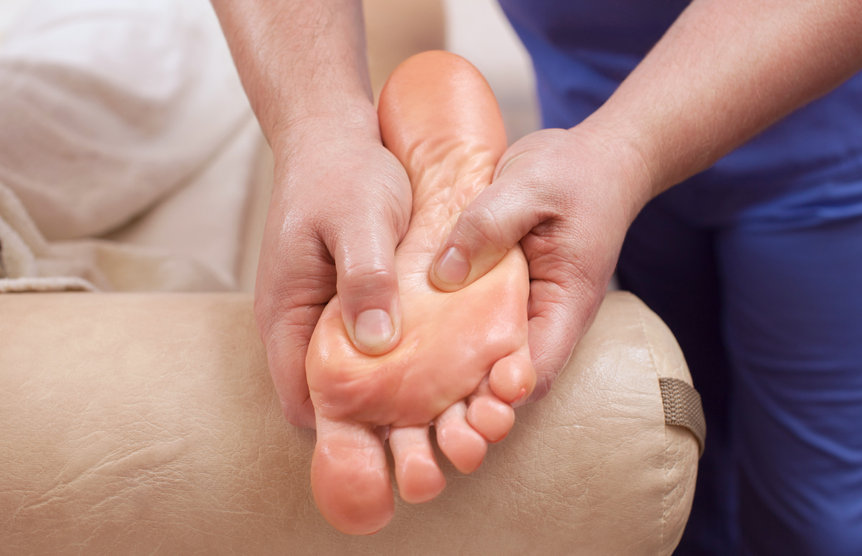Have you ever experienced a pain in your foot that seems to go away when you walk more? If so then you may be experiencing Plantar Fasciitis.
Plantar Fasciitis is an inflammation of tissue on the heel of your foot. Specifically the connective tissue of the plantar fascia ligament that connects your heel to your toes. This ligament is basically built in cushioning for your feet. It acts as a shock absorber as you walk, run and jump and protects your foot arch.
The most common causes of plantar fasciitis include excessive walking and running. Dance and any other activity that creates repetitive strain for the feet. Long distance runners and long term team sport players, also commonly experience plantar fasciitis.
Plantar fasciitis does also become more prevalent in older age groups, especially those aged between 40 and 60 years old. This is mainly down to wear and tear through the years. Pregnant women may also experience plantar fasciitis due to the extra strain on their feet.
Another factor that can cause plantar fasciitis is inadequate footwear. When you couple the wrong shoes with repetitive strain, it puts increased pressure on your feet.
Symptoms Plantar Fasciitis
Plantar fasciitis most often comes on quite suddenly. Patients regularly complain that it is worse in the morning and “appears from nowhere”. Despite the inflammation that causes plantar fasciitis, there are no visible signs on the foot to help with diagnosis.
Symptoms of plantar fasciitis include a significant pain in the heel of the foot that initially prevents walking. However, plantar fasciitis pain reduces when walked on. Only to then reoccur after the patient has been sat or resting the foot.
The pain of plantar fasciitis is most often described as a burning pain in the heel. After a day on your feet or a long walk, you might find this pain comes on out of the blue.
Plantar fasciitis can start out as a tenderness in the heel too. Only to increase to an intense pain in a matter of minutes or hours. Patients often go from feeling fine to having a pain that causes them to limp.
Heel pain when stretching or flexing the foot is a sure sign that plantar fasciitis is the issue. For athletes and exercise enthusiasts, this could become apparent when cooling down at the end of a workout or race.
How To Diagnose Plantar Fasciitis
It is best to have your foot pain checked by a doctor to prevent further damage and help manage pain. With plantar fasciitis it is better to get this done as soon as you start to feel pain that doesn’t go away after a day.
A diagnosis typically involves a review of your medical and fitness history and a thorough examination. As there are many things that can cause heel pain, your doctor might also order an X-ray or MRI. These tests will help to identify any heel spurs, fractures or other hidden issues. It is important to rule out all other types of heel pain to ensure that you receive the correct treatment.
Plantar Fasciitis Treatment & Pain Relief
Despite the fact that plantar fasciitis pain often reduces with movement, rest is key to recovery. We often find that patients try to ‘walk off’ plantar fasciitis pain only to prolong the pain which returns when they rest. Staying off your foot and taking a break from exercise will help your plantar fasciitis recover quicker.
Pain management is key with plantar fasciitis. We believe that no patient should live with pain and that is why we urge you to see a doctor quickly. Plantar fasciitis can be very painful and will hurt for longer if left untreated. Though it can go away on its own with rest, pain management will help the process.
Sometimes, an over the counter pain killer and cold press are sufficient for managing plantar fasciitis pain. As the pain eases some light stretches may help with recovery. Talk to your Roxboro GP about preventing plantar fasciitis recurring too. We are more than happy to suggest methods, including strengthening exercises, for prevention. For patients who do have frequently recurring plantar fasciitis, alternative pain relief methods may be suggested.
Shockwave Therapy is a non-invasive pain management treatment that is proven to be effective for plantar fasciitis. At Roxboro Medical Centre shockwave therapy is applied directly to the inflamed area using a special hand-held device. Pain can reduce significantly after just one treatment and healing time can be reduced.
If you are looking for Shockwave Therapy in Limerick or solutions to treat plantar fasciitis look no further than Roxboro Medical Centre.
Fill in the contact form below to find out more or book an appointment with one of our sports medicine doctors.

Dr. O’Donoghue has a keen interest in Sports Medicine and has completed a Masters Degree in Sports and exercise medicine from University College Cork achieving an honours degree. He has also done additional training in Neurofunctional Acupuncture from McMaster University in Hamilton Canada. He has completed the FIFA Football Medicine Diploma and is a trained provider of the EMS Swiss Dolorclast method for ESWT (extracorporeal shockwave therapy).
